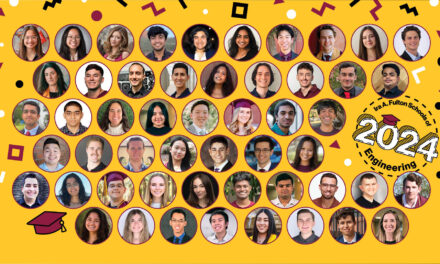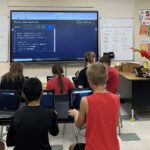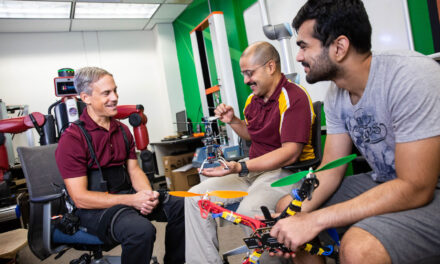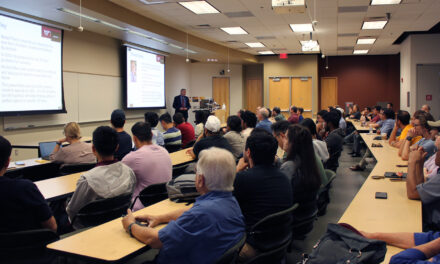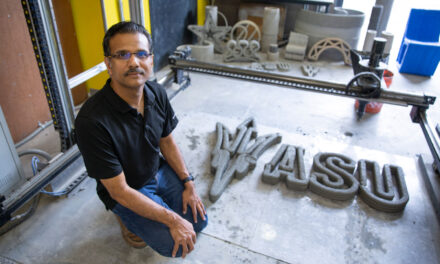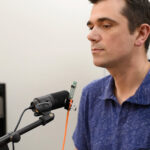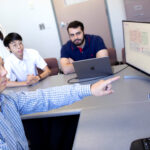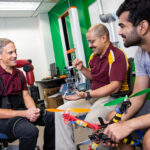
Panchanathan named one of ASU’s Outstanding Doctoral Mentors
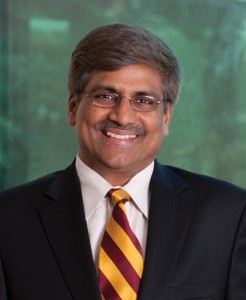
Sethuraman Panchanathan is a professor in the School of Computing Informatics and Decision Systems Engineering in ASU’s Ira A. Fulton Schools of Engineering and a senior vice president in ASU’s Office of Knowledge Enterprise Development.
Sethuraman “Panch” Panchanathan has been selected as one of the Outstanding Doctoral Mentors of 2014-2015 by the office of Graduate Education at Arizona State University.
Panchanathan is a professor in the School of Computing Informatics and Decision Systems Engineering and senior vice president in ASU’s Office of Knowledge Enterprise Development.
In nominations letters from current and former doctoral students, Panchanathan and two other doctoral mentors who received the awards are lauded for their generous commitment to their students despite daunting schedules of their own. The mentors frequently include their graduate students in research grants and as co-authors on numerous published papers and journal articles.
Students also levied praise for the mentors’ encouragement toward autonomy and independence, providing the skills to be professionals in their chosen careers, instilling them with high values and standards, welcoming them into the scientific process of research and writing, unwavering support and enthusiasm, as well as empowering their mentees with a desire to excel.
Each awardee has a special gift for mentoring students from diverse cultural and religious backgrounds, those with disabilities, underrepresented minorities, international students and women.
Panchanathan is also director of the Center for Cognitive Ubiquitous Computing (CUbiC), and the Foundation Chair of Computing and Informatics.
He investigates numerous technologies, including ubiquitous computing environments for enhancing quality of life for individuals with disabilities; health informatics; multimedia computing and communications; haptic user interfaces, which add tactile sensations to phones and wearable devices; media processor designs; and others.
His six-pronged approach to mentoring students is formed by the influences of inspiration, intellect, innovation, interdisciplinary, independence and impact.
“I strongly believe that graduate student mentoring is not only about the emphasis on hard skills such as being a strong technical leader and making innovative contributions to the field,” Panchanathan said, “but also about having the opportunity to acquire soft skills such as leadership, independence and an entrepreneurial mindset.”
“Panch takes a personal interest in each of his students,” said John Black, a research scientist in CUbiC. “He has an infectious enthusiasm about learning and research that quickly draws his students into the research process.”
Many of his mentees are now in leading positions in industry and academia. Students are often co-investigators on his more than $37 million in awarded grants.
An ongoing National Science Foundation Integrative Graduate Education and Research Traineeship (NSF-IGERT) project offers four-year fellowship awards to doctoral students to augment their doctoral program with disability research, education and training to become leaders in person-centered technologies.
In addition to many honors and memberships in prestigious organizations, he has been appointed to the U.S. National Science Board by President Barack Obama. He was elected a Fellow of the National Academy of Inventors for his outstanding inventions with an impact on quality of life, economic development and the welfare of society.
With CUbiC, Panchanathan created the iCARE project designed for individuals who are blind or visually impaired. The project won the Governor’s Innovator of the Year for Academia Award in 2004. The software design for the iCARE Note-Taker Project also won first place in the U.S. and second in the world finals for the Microsoft Imagine Cup 2011.
Written by Michele St George, ASU Graduate Education, [email protected]






